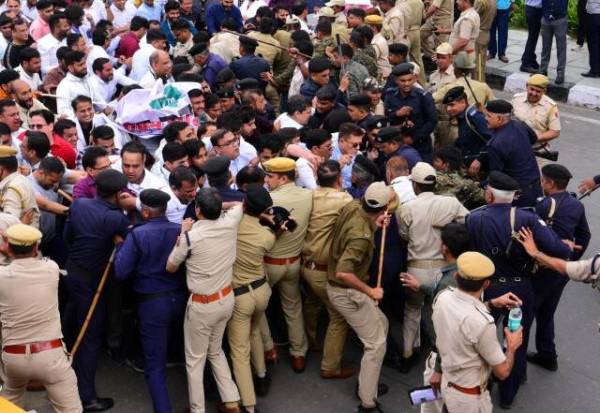Rajasthan Right to Health Bill: What the provisions say, why it is seeing opposition and protests
Rajasthan already has several healthcare schemes covering different sections of the population. Why then was the new Bill brought in? Why are doctors opposing it?
 Police use water cannons to disperse doctors protesting against the Rajasthan Right to Health Bill, at Statue Circle in Jaipur, Tuesday, March 21, 2023. (PTI Photo)
Police use water cannons to disperse doctors protesting against the Rajasthan Right to Health Bill, at Statue Circle in Jaipur, Tuesday, March 21, 2023. (PTI Photo)The Rajasthan Assembly on March 21 passed the Right to Health (RTH), even as doctors continued their protest against the Bill, demanding its complete withdrawal.
What is the Rajasthan Right to Health Bill?
RTH gives every resident of the state the right to avail free Out Patient Department (OPD) services and In Patient Department (IPD) services at all public health facilities and select private facilities.
The free healthcare services, including consultation, drugs, diagnostics, emergency transport, procedure and emergency care, will be provided subject to conditions specified in the rules, which will be formulated now.
Also, all residents will be entitled to emergency treatment and care without prepayment of any fee or charges, and the hospital can’t delay treatment on grounds of police clearance if it is a medico-legal case. The legislation says that “after emergency care, stabilisation and transfer of patient, if patient does not pay requisite charges, the healthcare provider shall be entitled to receive requisite fee and charges or proper reimbursement from the state government”.
The Bill extends a total of 20 Rights to the citizens of the state.
 Police lathicharge doctors during a protest in Jaipur on Monday. (Express photo by Rohit Jain Paras)
Police lathicharge doctors during a protest in Jaipur on Monday. (Express photo by Rohit Jain Paras)
Doesn’t Rajasthan already have health schemes?
Yes, other schemes do exist.
Under the Ashok Gehlot government’s flagship Chiranjeevi Health Insurance Scheme, free treatment up to Rs 10 lakh is provided. This has been increased to Rs 25 lakh in the latest budget, which will be implemented from the next financial year. Under this scheme, the government paid as many as 34.77 lakh claims worth Rs 1,940 crore between April 1, 2022 and December 31, 2022.
Secondly, there is the Rajasthan Government Health Scheme for government employees, which includes ministers, current and former MLAs, etc.
Third is the Nishulk Nirogi Rajasthan, which also includes the Free Medicine scheme. Under this, all OPD and IPD services in government hospitals, including the registration fee, are provided for free. It covers about 1,600 medicines, 928 surgicals and 185 sutures. As of December end, it had benefitted 8.6 crore patients at a cost of Rs 1,072 crore between March-December 2022.
Four, there is the Free Test scheme which provides for up to 90 free tests in government hospitals attached with medical colleges, 56 tests in district, sub-district hospitals, and so on. Between March-December 2022, 2.93 crore persons had benefited from it.
So what was the need for the RTH?
Healthcare is close to the heart of Chief Minister Gehlot, who had come up with the Chiranjeevi scheme, and is pushing to develop Rajasthan as a model state when it comes to health. However, his government has often been panned over the implementation of the Chiranjeevi scheme, especially at the end of private hospitals.
During the debate on the Bill in the Assembly, Health minister Parsadi Lal said, “It is true that despite having a Chiranjeevi card, hospitals sometimes ask a patient for money, to deposit an advance. I get a lot of complaints, and we have even made hospitals return such money…hence we are bringing this Bill.”
As per the Bill, anyone found in contravention of the Act will be punishable with a fine of up to Rs 10,000 for the first contravention, and up to Rs 25,000 for the subsequent contraventions. However, many have pointed out that the penalty may be too low for hospitals.
Second, with Congress and BJP taking turns to rule Rajasthan and both accusing each other of renaming and altering schemes, bringing an Act would ensure that subsequent governments abide by its provisions and extend free healthcare mandatorily.
Third, CM Gehlot would hope to be remembered for his welfare schemes, with his legacy of numerous healthcare schemes at the top. The present Bill is a step in that direction.
What is the clause about emergency in the RTH?
One of the most contentious issues of the RTH was emergency care, leading to protests by doctors.
After being changed by the Select Committee, the clause that was eventually passed Tuesday states that people will have the right to emergency treatment and care for accidental emergency, emergency due to snake bite/animal bite and any other emergency decided by the State Health Authority under prescribed emergency circumstances.
Importantly, this can be availed without prepayment of requisite fee or charges for prompt and necessary emergency medical treatment and critical care, emergency obstetric treatment and care, by any public or private health institution qualified to provide such care or treatment according to their level of health care.
What is the Opposition’s objection to the Bill?
During the debate on the Bill Tuesday, the BJP’s opposition primarily centred on two points. It demanded that in case of private facilities, only multispecialty hospitals with 50 beds be included and that there should be a single forum for complaints.
BJP MLA Kalicharan Saraf said, “If a cardiac patient reaches an eye hospital, how will he get treatment? Hence we demand that only multispecialty hospitals with 50 beds be included under the law.” The Health Minister said that this specification for private hospitals will be included in the Rules made as part of the Act.
Saraf and Deputy Leader of Opposition Rajendra Rathore, both of whom held the health portfolio in the previous government and were part of the Select Committee for the Bill, demanded that the government incorporate these two points in the Bill itself.
On the demand for a single window system for redressal, Rathore said: “Right now, you can complain against the doctors with the Medical Council, Consumer Court, under the Medical Protection Act, with the Human Rights Commission … there are 50 places where you can complain against a doctor.” Saraf said, “Now you are adding one more forum for complaints. Will the doctor practice or only occupy himself with redressal of complaints?”
Why are doctors protesting?
Dr Neeraj Damor, president, Jaipur Association of Resident Doctors (JARD), questioned the need for the RTH. “When you already have schemes such as Chiranjeevi which cover the majority of the population under existing rules, why bring RTH and impose it on doctors?” He said that there are several clauses doctors are still objecting to, including defining ‘emergency’, and “compelling doctors of one speciality to treat patients outside their speciality as part of emergency.”
However, the government has repeatedly said that the definition of “emergency” was reworked only after consultations with doctor associations, while the second part will be addressed in the Rules which will be made subsequently, and hence there is no question of compelling doctors to treat outside their speciality.
Sunil Chugh, president of IMA Rajasthan, said that the IMA has demanded inclusion of several clauses in the Bill. One of them lists nine “responsibilities and duties” that the patients and caretakers should have towards the healthcare facilities: be respectful to providers; avoid crowding with a patient; not to be abusive or with violent behaviour; timely meet financial responsibilities,” etc.
Another clause lists as many as 17 “Rights of Health Care Providers,” such as “to be treated with respect by patients and the person attending the patient; to be duly informed when patients are seeking a second opinion; to get the tests done in-house or the nearest lab in case of an emergency to prevent delay in patient care; cost of treatment reimbursement must be within 15 days through a separate portal other than government health insurance schemes,” etc. Chugh says that the suggestions were received after a meeting with office bearers from across the state, and as these demands were not included, the Bill should have been dropped.
However, government sources said the latest demands are an “addendum” to the doctors’ earlier demands, almost all of which have already been met, and accused the protesting doctors of constantly shifting goalposts so that the Bill is not passed in any form.
“Earlier, the doctors’ objection was that they were not consulted before the formulation of the Bill. So we sat down with all the associations. They had two major objections: that emergency be defined properly, and that their representatives be included in the state and district health authorities which, they claimed, were dominated by bureaucrats and politicians,” an official said.
“So we defined the term emergency as per their demand, and even removed the provision for the government nominating two members to state and district authorities in the Bill, and went as far as replacing it with a provision for IMA itself to nominate two representatives to district and state authorities. In the district committee, we also removed Zila Pramukh and three Pradhans of Panchayat Samiti. So we have in fact gone a step further than what they asked,” the official said.
“Essentially, right now, the private hospitals act on their whims, like insisting on in-house investigation reports, declining to hand over files. The system lacks transparency and they often over-charge for various services. Once the citizens are made aware of their rights through the Act and the system becomes more transparent with the involvement of the government, then perhaps the hospitals won’t be able to mint as much money by charging deceptively. That’s the real reason behind the doctors’ protest,” the official alleged.
The Bill empowers patients “to choose source of obtaining medicines or tests at all health care establishments”, which means that hospitals cannot insist on in-house medicines or tests.
If a patient wishes to leave, they will have to be given “treatment summary in case of a patient leaving health care establishment against the medical advice,” or “to obtain treatment records and information from the treating health care establishments to seek second opinion from another health care professional or health care establishment.”



- 01
- 02
- 03
- 04
- 05



































